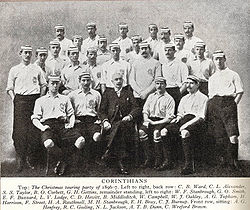On April 12th 1939, the Corinthian Football Club played its last game again the Royal Navy and Royal Marines at Chatham, winning 1-0. The famous "true" amateurs merged with their fledgling club, The Casuals, to form the Corinthian-Casuals FC, a club that still plays today in the "Pyramid". Modern badge below.
The club was famed for its ethos of "sportsmanship, fair play, [and] playing for the love of the game". Corinthian Spirit, still understood as the highest standard of sportsmanship, is often associated with the side. This spirit was famously summed up in their attitude to penalties; "As far as they were concerned, a gentleman would never commit a deliberate foul on an opponent. So, if a penalty was awarded against the Corinthians, their goalkeeper would stand aside, lean languidly on the goalpost and watch the ball being kicked into his own net. If the Corinthians themselves won a penalty, their captain took a short run-up and gave the ball a jolly good whack, chipping it over the crossbar." Among others, Real Madrid were inspired to adopt Corinthian's white strip, while Sport Club Corinthians Paulista in Brazil and Zetjun Corinthians in Malta adopted their name. Within twenty years the Corinthians were to become the greatest and most attractive team that football had then known. With an intelligent nonchalance and in their tailored shirts and well-cut shorts they brought a quality and culture to the game.
The club was founded on 28 September 1882 by Nicholas Lane Jackson, Assistant Secretary of the Football Association. At that time, football was still amateur, with the English game dominated by southern clubs. In international football (which had not yet spread beyond the home nations), Scotland prevailed, having won three consecutive matches over England by scores of 5–1, 6–1 and 5–4. Jackson attributed Scotland's success to "the greater opportunities our opponents over the border [have] of playing together", and aimed to counteract this by forming a club "composed of the best amateur players in the kingdom". In order to accomplish this aim, Corinthian took care to avoid playing matches on Saturdays (when players might be playing for other clubs). The first proposed name for the club was the "Wednesday Club", but this was changed to the "Corinthian Football Club" on the suggestion of Harry Swepstone. From the outset, Corinthian supplied large numbers of players to the England football team. During the 1880s, the majority of England caps were awarded to Corinthian players and, for two England matches against Wales in 1894 and 1895, the entire team consisted of members of the club (a feat achieved by no other club, before or since).


Corinthian began competing in the FA Cup from the 1922-3 season. They also competed in the 1927 FA Charity Shield against FA Cup winners Cardiff City, losing 2–1 at Stamford Bridge.


No comments:
Post a Comment